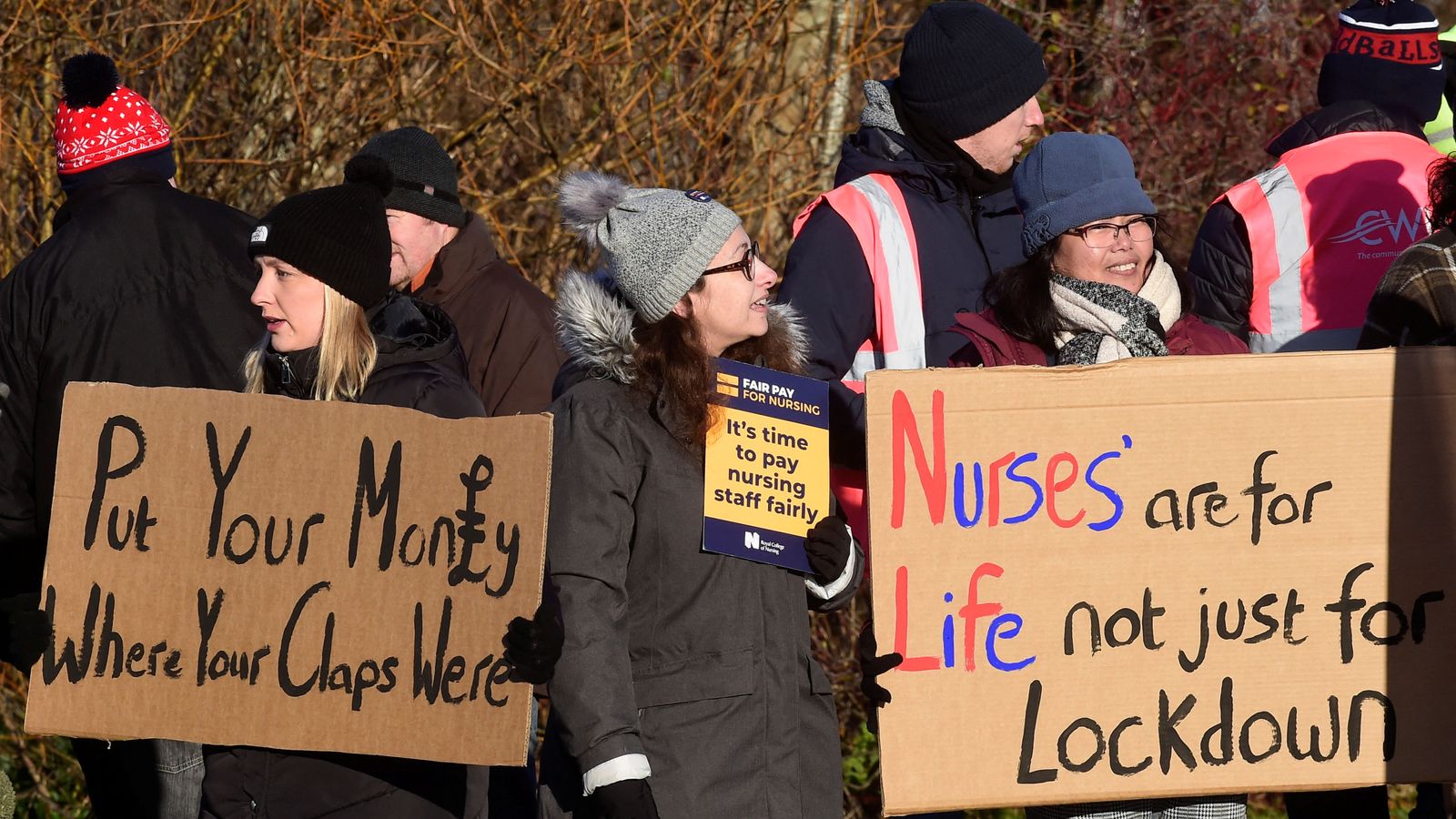Downing Street has said there are “no plans” to look again at the pay deal for nurses who are staging their biggest ever strike in the history of the NHS – despite some Tories calling for a rethink.
Ministers are under pressure to ask NHS pay reviewers to reconsider their recommendations as a way to end the strikes by offering higher rises.
At the end of a day that saw thousands of nurses take industrial action, Royal College of Nursing general secretary and chief executive Pat Cullen said it would be a “turning point” in their campaign.
She said: “Today will be a turning point in the campaign for fair nursing pay. At the end of it, ministers find themselves under fresh pressure from unexpected places – their own MPs, NHS leaders and a former chair of the Pay Review Body.
“Each of these groups, for different reasons, wants the government to stop hiding behind its current fig leaf.
“On a bitterly cold day, the public warmth towards nursing staff was immense. For my members, this has been about professional pride, not personal hardship – speaking up for nursing, patients and the future of the NHS.”
Matthew Taylor, chief executive of the NHS Confederation, also urged the government to act, saying: “The government cannot just sit back and let future strikes happen when patient care is on the line.”
‘We are exhausted and deflated’ – nurses’ stories from picket lines across the country
Tens of thousands of nurses strike today in first mass walkout in a century
Nurses ‘will continue to strike in January without pay negotiations’, warns RCN leader
The NHS pay review body (PRB) has recommended below-inflation pay rises of around 4% for nurses and the government is refusing to negotiate with unions who want a higher offer because it has accepted this recommendation.
But unions have warned they will continue to strike in 2023 if a better pay deal is not put on the table, as questions are raised about the “independence” of the PRB.
Jerry Cope, a former head of the pay review body, insisted it was “fiercely independent” but said ministers should ask the group to think again because their decision could be “lagged” as the recommendations were made before inflation peaked amid the war in Ukraine.
Conservative chairman of the Commons Health Committee Steve Brine added his name to the Tory MPs suggesting ministers should negotiate with the RCN on pay by asking the reviewers to look again.
“Everyone needs to cool it and I think sending it back to the pay review body to have a look would be a sensible answer,” he told the BBC’s World At One programme.
The idea of looking again at pay has been backed by other Tories, including Dr Dan Poulter, who told the Guardian that “inflation has significantly eroded real-terms pay since the review bodies made their recommendations earlier in the year” and the government should “improve on the current offer on the table”.
Former Conservative Party chairman Sir Jake Berry, meanwhile, urged the government to “improve its offer” on pay.
But the prime minister’s official spokesman said there were “certainly no plans to tell the independent body what to do”.
And Steve Barclay, the health secretary, appeared to rule out any movement during a visit to London’s Chelsea and Westminster Hospital.
Please use Chrome browser for a more accessible video player
Mr Barclay has repeatedly said the government is sticking to the recommendations of the PRB, which said nurses should get a pay rise of about £1,400.
The RCN has been calling for a pay rise at 5% above RPI inflation, so around 19% in total, though it has indicated it would accept a lower offer.
Read More:
‘We are exhausted and deflated’ – nurses’ stories from picket lines across the country
Nurses across England, Wales and Northern Ireland are taking part in industrial action – involving around a quarter of hospitals and community teams in England, all trusts in Northern Ireland and all but one health board in Wales.
Health minister Maria Caulfield said around 70,000 appointments, procedures and surgeries will be lost in England due to the strike and thousands more will be affected in Northern Ireland and Wales.
Please use Chrome browser for a more accessible video player
Speaking from the picket line outside Aintree Hospital in Liverpool, Matron Rose James – who has been in the NHS for 38 years – told Sky News that it is now “much more difficult for nurses to come into the jobs after they took away the bursary”.
“So trainee nurses have to spend money training and for what?” she added. “To be paid in some cases less than if you worked in a coffee shop. That’s not right. We need to retain our brilliant nurses.”
Meanwhile, the RCN has said nurses have reached a “crisis point” and the strikes today are not just about pay but also about patient safety.






















